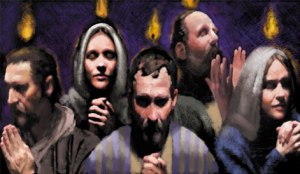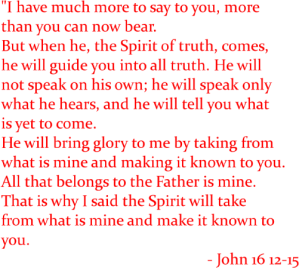During the month of May we give thanks to Mary and honor her for all her blessings upon us. On this final day of May we wrap up a month during which we celebrated in thanksgiving for our mothers on Mother’s Day, and feel Mary’s encouraging presence reminding us to be ever open to God’s love.
What a gift today to take time to pray with the story from Luke of Mary visiting her cousin Elizabeth when they were both expecting their sons, Jesus and John. Visitation means “visit.” The Archangel Gabriel told the Blessed Virgin Mary that her cousin Elizabeth was going to have a baby boy in her old age. Mary loved Elizabeth and knew she could use some help. So she set out at once on the journey.
Mary too was expecting a baby, the baby Jesus. The trip into the hill country where Elizabeth lived was long, dangerous and uncomfortable. But that would not stop Mary and she rode there on a donkey, as that was the best way to travel in the hill country.
Mary reached her cousin’s house and greeted Elizabeth. At that moment, the Holy Spirit revealed to Elizabeth that Mary had become the mother of God our savior.
Elizabeth asked joyfully, “How have I deserved that the Mother of my Lord should come to me?” Mary was not boastful or proud of this great honor, but remained humble and quickly gave all the credit to God. He had blessed her so richly.
Today I am overwhelmed by Mary’s amazing witness to God’s love. She tells Elizabeth: “My soul proclaims the greatness of the Lord. My spirit rejoices in God my Savior, for he has looked with favor on his lowly servant.” She goes on to tell Elizabeth: “He has filled the hungry with good things and the rich he has sent away empty.”
I am struck by the calm confidence Mary has in God’s steadfast love. She took enormous risk to accept the invitation of that love, but she trusted. I hear Mary calling me to be open and available to God’s love of me. I too am God’s lowly servant who is hungry for the goodness of the Lord. Mary wants me to celebrate the gift of God’s love with her rather than passively praying about her life. She assures me God loves me as he loves her.
Now I feel inspired by Mary to bear witness to God’s love. This inspiration brings more questions than answers: How can I be aware of the signs of God’s presence within me? How can I be more present to others modeling the way Mary was so present to her cousin Elizabeth? In the hectic pace of life, how can I slow down so I can make the best choices with the gifts I have been given by God? Where do I need to be brave and be more explicit about my faith? How can I bring that faith to action for the greater glory of God?
Filed under: Uncategorized | Leave a comment »











